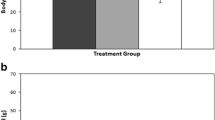Abstract
Parent-offspring conflict may arise because the lifetime reproductive success of the parent is more influenced by its life span than by reproductive success during a particular reproductive event, while the fitness of an offspring depends firstly on its own survival as a juvenile and only subsequently on its own reproductive success. The naive immune system of young animals may allow offspring to be much more affected by parasites than their parents, and thus cause an initial asymmetry in a potential parent-offspring conflict. We investigated this type of conflict by assessing the health status and the immune response of parent and offspring sand martins Riparia riparia infested with manipulated loads of ticks Ixodes lividus (nests either treated with pyrethrin, water, or just visited). The prevalence and the intensity of tick infestations differed among treatments, with low tick loads in nests with the pyrethrin treatment. Ticks reduced the reproductive success of the host and increased offspring wing length. Broods with ticks had higher leukocyte concentrations and concentrations of immunoglobulins. The concentration of immunoglobulins in nestlings was negatively related to brood size and nestling tarsus length. Nestlings receiving the control treatments had a positive association between wing length and the concentration of immunoglobulins and a negative association between tarsus length and immunoglobulins. In contrast, adult sand martins did not respond to the parasite treatment in terms of immune response. Hence, the naive immune system of nestlings may be the crucial factor causing the parent-offspring conflict over costs of parasitism to be resolved to the advantage of parents that may sacrifice nestlings in heavily parasitized nests.
Similar content being viewed by others
Author information
Authors and Affiliations
Additional information
Received: 30 March 1998 / Accepted: 5 December 1998
Rights and permissions
About this article
Cite this article
Szép, T., Møller, A. Cost of parasitism and host immune defence in the sand martin Riparia riparia: a role for parent-offspring conflict?. Oecologia 119, 9–15 (1999). https://doi.org/10.1007/s004420050755
Issue Date:
DOI: https://doi.org/10.1007/s004420050755




